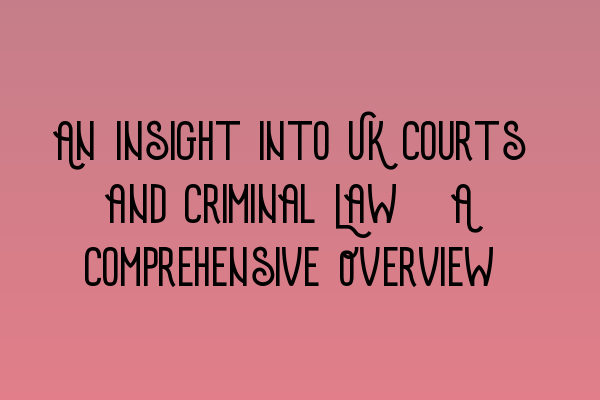An Insight into UK Courts and Criminal Law: A Comprehensive Overview
Welcome to SQE Criminal Law & Practice Law UK, a trusted and experienced team of solicitors specializing in criminal law. In this blog post, we will provide you with a comprehensive overview of the UK courts and criminal law system. Whether you are a law student, a potential client, or simply someone interested in understanding the legal landscape, this article will present you with valuable insights.
The UK Courts System
The UK courts system is divided into multiple levels, each with its own jurisdiction and responsibilities. At the top sits the Supreme Court, the highest appellate court in the country. It primarily deals with cases of national importance and constitutional matters.
Below the Supreme Court are the Court of Appeal and the High Court. The Court of Appeal hears appeals from lower courts and reviews their decisions, while the High Court handles civil and criminal cases of significant importance.
Moving further down, we have the Crown Court, which deals with serious criminal cases such as murder, rape, and drug trafficking. It is presided over by professional judges and handles both trials and appeals.
Lastly, we have the Magistrates’ Court, which deals with less serious criminal cases known as summary offenses. It is presided over by magistrates who are not necessarily legal professionals.
The Criminal Law System
The criminal law system in the UK is complex and multifaceted. It encompasses a wide range of offenses, from minor infringements to serious crimes. It aims to maintain social order, protect individuals and properties, and deliver justice to both victims and offenders. Criminal law covers various areas, such as murder, theft, assault, drug offenses, fraud, and more.
When a crime is committed, the police are responsible for investigating the matter and gathering evidence. Once they have gathered sufficient evidence, they pass it to the Crown Prosecution Service (CPS), who will then decide whether to proceed with formal charges and prosecute the alleged offender.
If the case proceeds to court, the defendant is given an opportunity to present their side of the story and defend themselves. The prosecution must prove beyond a reasonable doubt that the defendant is guilty of the crime they are charged with.
To ensure fairness and impartiality, the court proceedings are conducted in public, and both the prosecution and the defense can call witnesses, present evidence, and cross-examine the opposing side.
If the defendant is found guilty, sentencing takes place. The court considers various factors such as the nature and severity of the crime, the defendant’s criminal record, and any mitigating or aggravating circumstances. Sentences can range from fines and community service to imprisonment or even life sentences for the most serious offenses.
Conclusion
Understanding the UK courts and criminal law system is essential for both legal professionals and individuals seeking legal assistance. At SQE Criminal Law & Practice Law UK, we have a team of highly skilled solicitors ready to guide and represent you throughout the legal process.
To learn more about preparing for the SQE exams or to explore our range of preparation courses, visit our SRA SQE Exam Dates page. We also offer SQE 2 Preparation Courses and SQE 1 Preparation Courses to help aspiring solicitors achieve success in their legal careers.
